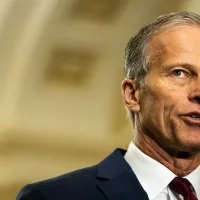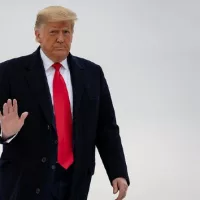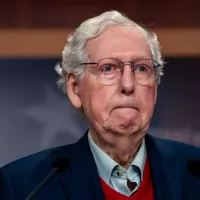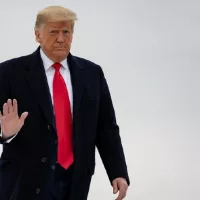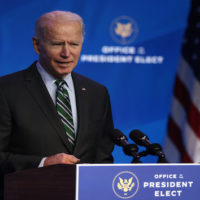
Alex Wong/Getty ImagesBY: MOLLY NAGLE, ABC NEWS
(WASHINGTON) — President-elect Joe Biden is still planning to take his oath of office on the west side of the U.S. Capitol Wednesday despite growing concerns over safety for the event, incoming White House Communication Director Kate Bedingfield said Sunday on ABC’s “This Week.”
“Well, that is certainly our plan,” Bedingfield said when asked by ABC News Chief Anchor George Stephanopoulos if she was certain the ceremony would go forward as planned.
“I think that will send an incredibly important visual image to the world about the resilience of American democracy. And so our plan and our expectation is that President-elect Biden will put his hand on the Bible with his family outside on the West side of the Capitol on the 20th,” Bedingfield said.
Authorities have been tracking an array of potential threats ahead of the inauguration, following the deadly riots at the Capitol. They have led to changes to Biden’s inaugural plans — already altered by the pandemic.
While the oath of office is moving forward as planned, Bedingfield said Sunday that the incoming White House staffers are preparing for any threats that should arise.
“We’re in volatile times, and so we are making preparations,” she said. “We’ll begin meeting tomorrow, daily meetings with the outgoing leadership in national security and law enforcement to ensure that we’re preparing for any scenario that should arise after noon on January the 20th.”
Despite the increased threats, Biden told reporters on Friday that he felt safe with the inauguration plans, which include an outdoor ceremony where Biden is expected to deliver his inaugural address.
“What can Americans expect to hear on Wednesday? What is the major goal of this address?” Stephanopoulos asked Bedingfield.
“I think you can expect that this will be a moment where President-elect Biden will really work to try to turn the page on the divisiveness and the hatred over the last four years and really lay out a positive, optimistic vision for the country, and … lay out a path forward that really calls on all of us to work together,” Bedingfield said previewing the speech.
Following his oath of office, Biden is preparing for an aggressive start for his administration, planning to sign roughly a dozen executive actions on Inauguration Day itself fulfilling many of Biden’s most frequent campaign promises, including rejoining the Paris Climate Accord, ending the “Muslim Ban” — put in place under President Donald Trump — and freezing federal student loans payments and interest.
“President-elect Biden, then President Biden, is going to come into office and take decisive steps to rollback some of the most egregious moves of the Trump administration, and he’s gonna take steps to move us forward,” Bedingfield said of the lengthy list of executive actions Biden has planned for his first 10 days in office.
The actions will be in addition to Biden’s legislative efforts in Congress — including a massive $1.9 trillion stimulus and COVID relief policy that Biden proposed earlier this week, and Biden’s long standing pledge to deliver a comprehensive immigration bill to the legislative body on day one that includes a pathway to citizenship — while contending with a looming Senate Impeachment trial for Trump.
Biden has already faced some concern from congressional Republicans and even some Democrats about the nearly $2 trillion price tag. When pressed by Stephanopoulos on the pushback, Bedingfield argued there are some signals of bipartisan support for the core of the proposal.
“Sen. (Marco) Rubio supports direct relief checks. Sen. (Mitt) Romney supports expanding the child tax credit. I mean, there is bipartisan support for the big planks of this plan. And I would also note that the plan came about as a result of consultation with bipartisan governors and mayors from all across the country,” she said.
But getting the extensive measure through Congress will face further complications amid the second Senate impeachment trial of Donald Trump’s presidency. Biden has said he would like the Senate to move forward with a “bifurcated” process: splitting the day to make progress on legislative efforts while also holding the trial.
“His great hope is that they’re going to be able to do that, and I think if you look, you know, there’s precedent for that. If you look at the previous impeachment trial, the Senate was able to move forward on floor business while also conducting the trial,” Bedingfield said.
“So, his hope as he’s spoken privately to congressional leadership, but also publicly about, is that the Congress is going to be able to move forward on focusing on the virus and on the economy while simultaneously doing their constitutional duty.”
Copyright © 2021, ABC Audio. All rights reserved.







